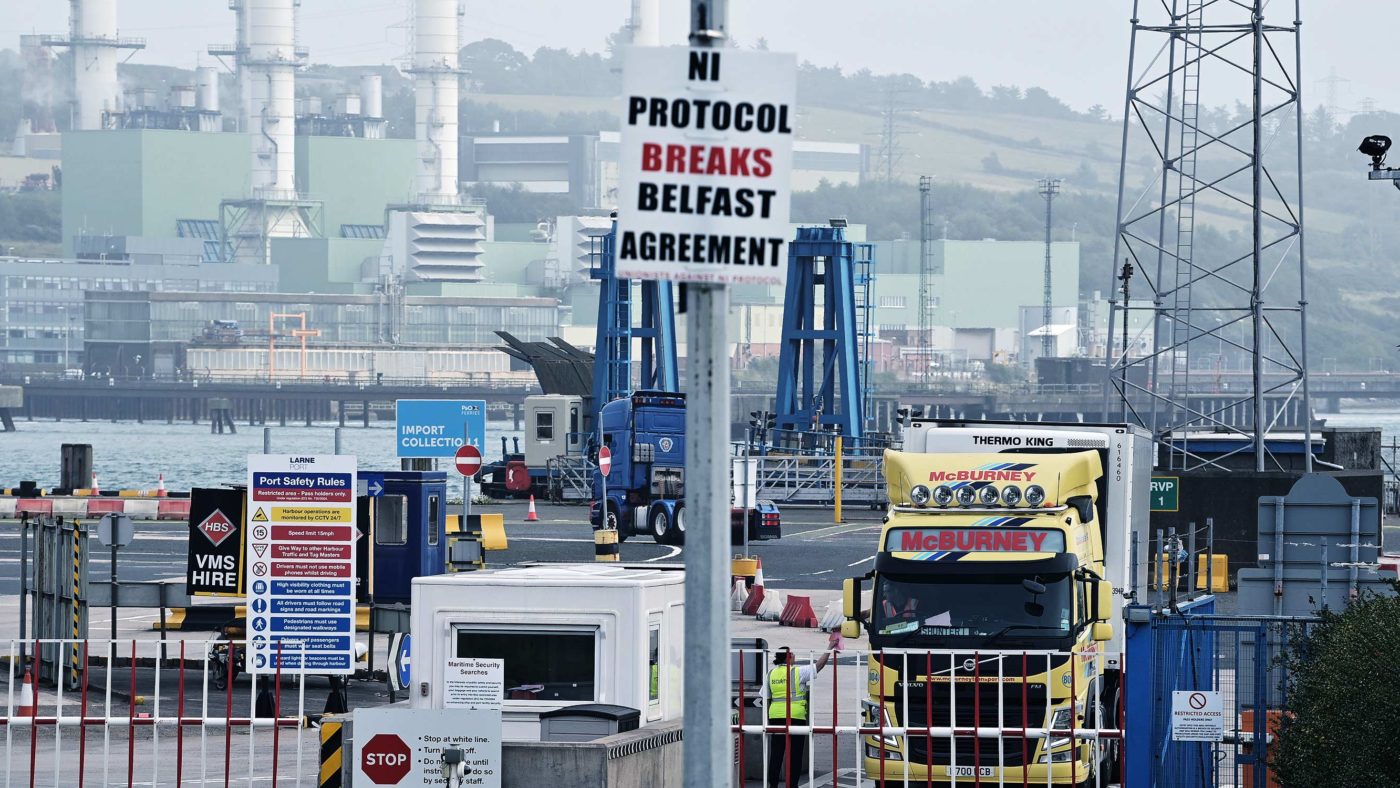In an article in this week’s Sunday Telegraph, Foreign Secretary and Brexit negotiator Liz Truss reiterated that the UK will trigger Article 16 if the EU does not make rapid concessions on the Northern Ireland Protocol. For more than six months, ministers have directed this threat at Brussels, as the Government tried in vain to dismantle the internal economic border between Great Britain and Ulster that it signed up to in 2019.
Political leaders in Northern Ireland offered standard issue responses to Truss’s remarks. Unionists applauded her apparent resolve, while nationalists and pro-EU liberals criticised her tone as ‘unhelpful’. That may have inspired a pronounced sense of déjà vu, but as it happens developments in the province’s devolved government could soon overtake protracted negotiations with Brussels anyway.
The commencement of legal proceedings against Irish Sea checks by a prominent anti-Protocol campaigner, has forced Northern Ireland’s Agricultural Minister, Edwin Poots, to submit their operation to a potential vote at the Stormont Executive.
Last week, the Unionist Voice Policy Studies group published a report explaining the grounds for the legal action. The outfit is fronted by loyalist activist Jamie Bryson, who launched a case against the Department of Agriculture at the end of last year, and Baroness Hoey wrote the foreword to the report.
The basis of the challenge was deceptively simple.
Stormont’s power-sharing rules determine that ‘significant’ or ‘controversial’ aspects of policy must be discussed and agreed by the Northern Ireland Executive. In order to implement the Protocol against the wishes of unionists, the Government changed the law (and deviated seriously from the Belfast Agreement) so that a simple majority of MLAs in the Assembly, rather than a majority of unionists and nationalists, could back the Irish Sea border. But the requirement for ministers to agree on controversial decisions remained in place via the Northern Ireland Act and the ministerial code.
The Department of Agriculture, under Mr Poots’ leadership, is responsible for implementing checks at Ulster’s ports under the terms of the Protocol. Mr Bryson argued that this policy should have been discussed and agreed by the Executive, to render it legal.
Rather than fight his claim in court, the department effectively conceded its validity. Mr Poots announced that he would table a paper on the operation of Protocol checks, for the consideration of fellow ministers, before the end of January.
The question is, what now?
Poots is a veteran DUP politician who was briefly party leader last year, before being toppled by colleagues. HIs nationalist and Europhile opponents point out that he only ever implemented the Protocol against his will and they are cynical about his motives in accepting the basis of this legal challenge.
If the paper reaches the Executive, unionists will almost certainly vote against it, given how vehemently they oppose the Irish Sea border. The assumption is that Poots would then instruct his officials to stop operating checks, because the power-sharing government does not back them.
Sinn Fein has threatened to block the paper from reaching the Executive at all. If that were to happen, then Poots could still argue that the sea border was unlawful, because ministers had not discussed it, and that he was obliged to stop implementing it.
Either way, the law here is significant.
Critics will ask why a seasoned minister like Poots raised border posts – to which he was opposed – in the first place, if they required the approval of the Executive. The policy was clearly ‘significant’ and ‘controversial’. Irish Sea checks have been the biggest issue in Northern Irish politics since they were first mooted as part of Theresa May’s backstop.
Setting aside matters of judgement, the precedent suggests that all new aspects of Protocol policy must be agreed by Stormont ministers along cross-community lines.
By the end of the month, Poots could demand that civil servants dismantle the existing sea border. Even more significantly, if it must first be signed off by the Executive, unionists could effectively veto any further implementation of the Protocol.
While the Government spent six months threatening to trigger Article 16 and suspend the sea border, for most of that time, the DUP was warning that it would collapse power-sharing unless action was taken. Notably, on Monday its leader, Jeffrey Donaldson, paused that threat because he believes he is ‘on the same page’ as Ms Truss.
It could be that the DUP believes the new Brexit minister will deliver a lasting solution to the Protocol’s problems. In Sunday’s article, Truss said her aim was to have ‘no checks or documentation for goods moving from Great Britain to Northern Ireland and staying there’. That’s exactly what unionists have always asked for.
On the other hand, the Bryson legal challenge may have caused Donaldson to rethink his party’s strategy. If unionists really can veto aspects of the Protocol at the power-sharing executive, it would be a strange time to withdraw ministers from Stormont.
These machinations certainly promise a turbulent and unpredictable few months, as Assembly elections approach in May. The Protocol continues to poison and destabilise politics in the province. And the last thing the prime minister will want is to have to administer border posts in Ulster ports over the heads of devolved politicians, at such a sensitive time.
The fastest way to defuse this situation is to end checks and paperwork and restore Northern Ireland’s integral place in the UK. It looks like events in Belfast will ensure there is simply no more time for the government and the EU to deliberate.
Click here to subscribe to our daily briefing – the best pieces from CapX and across the web.
CapX depends on the generosity of its readers. If you value what we do, please consider making a donation.


